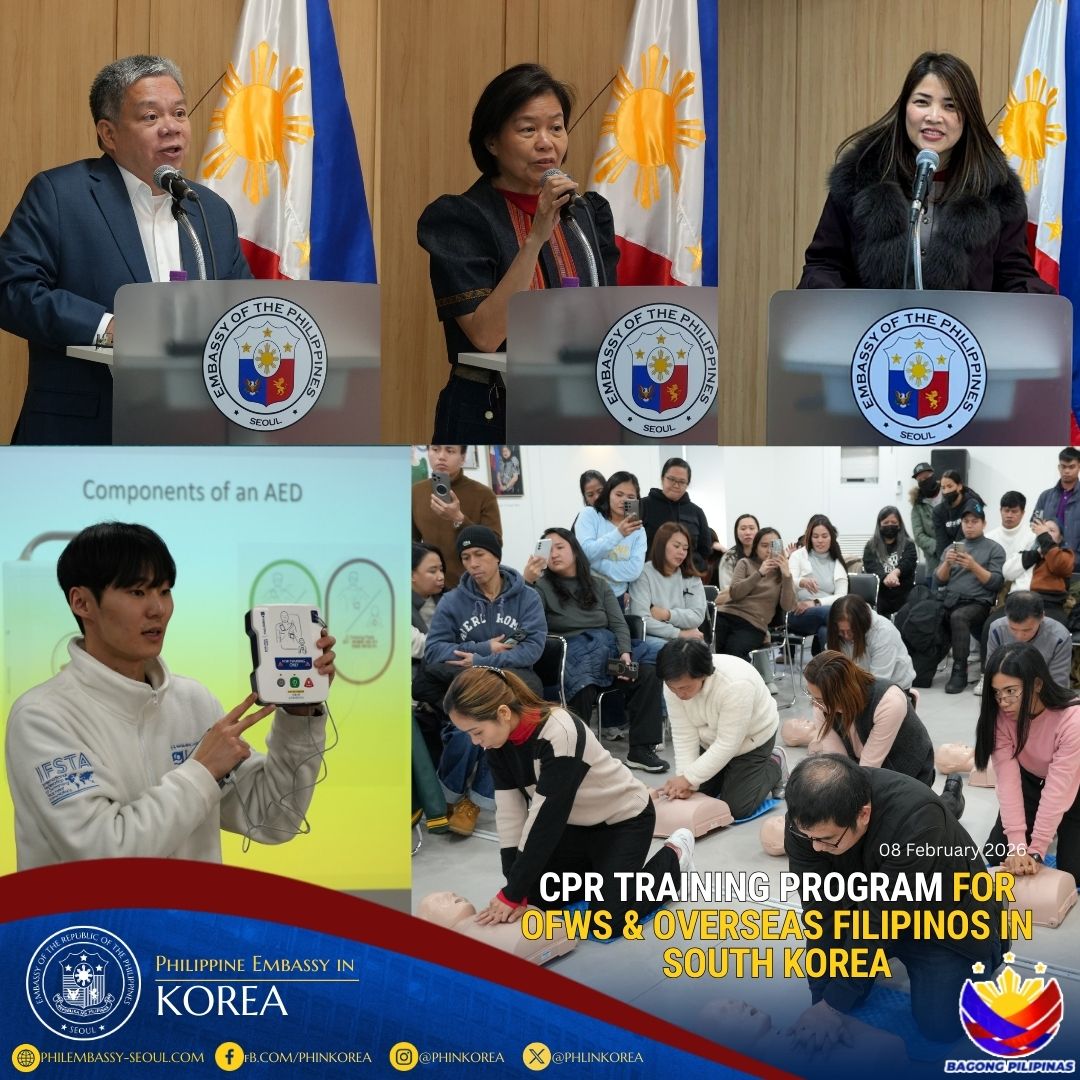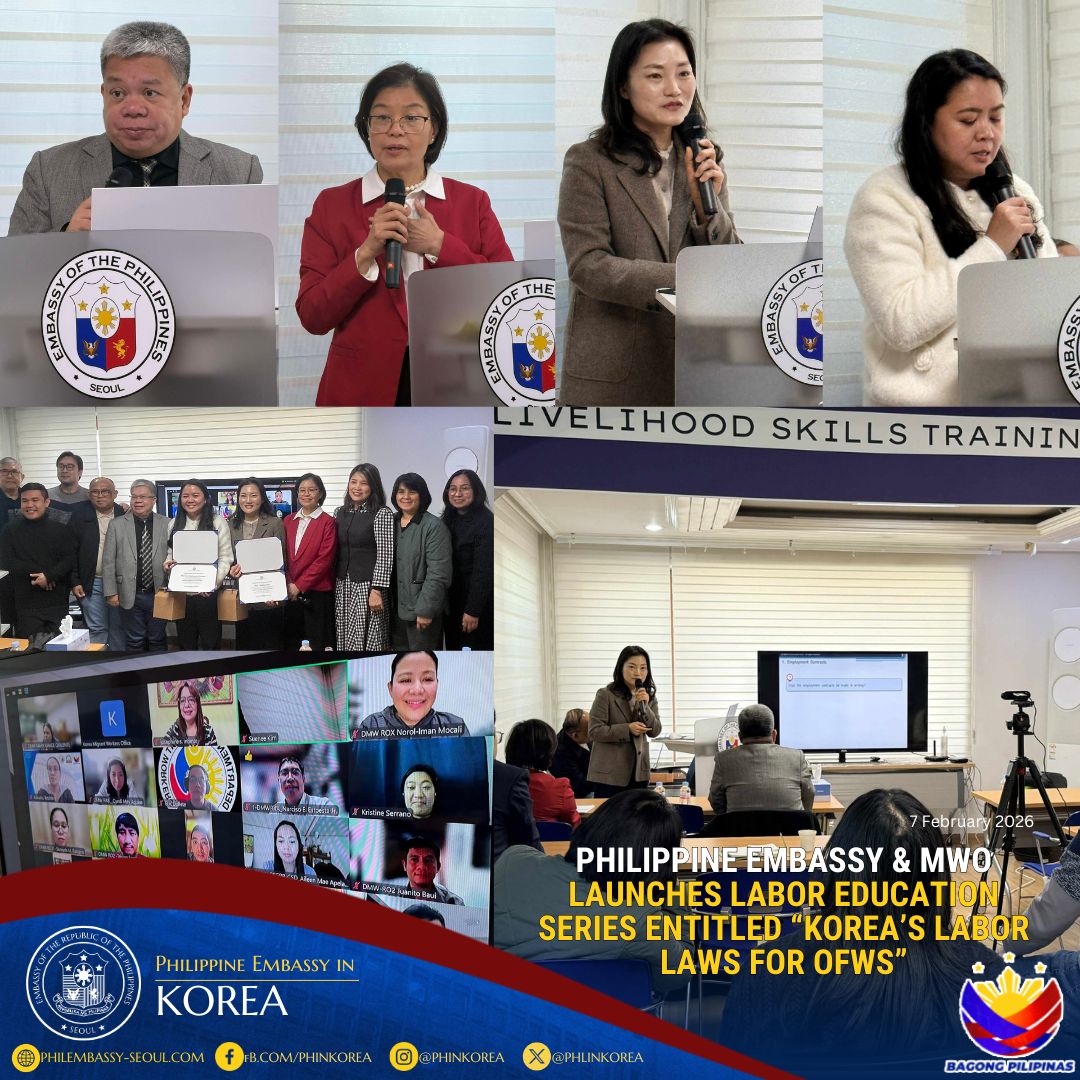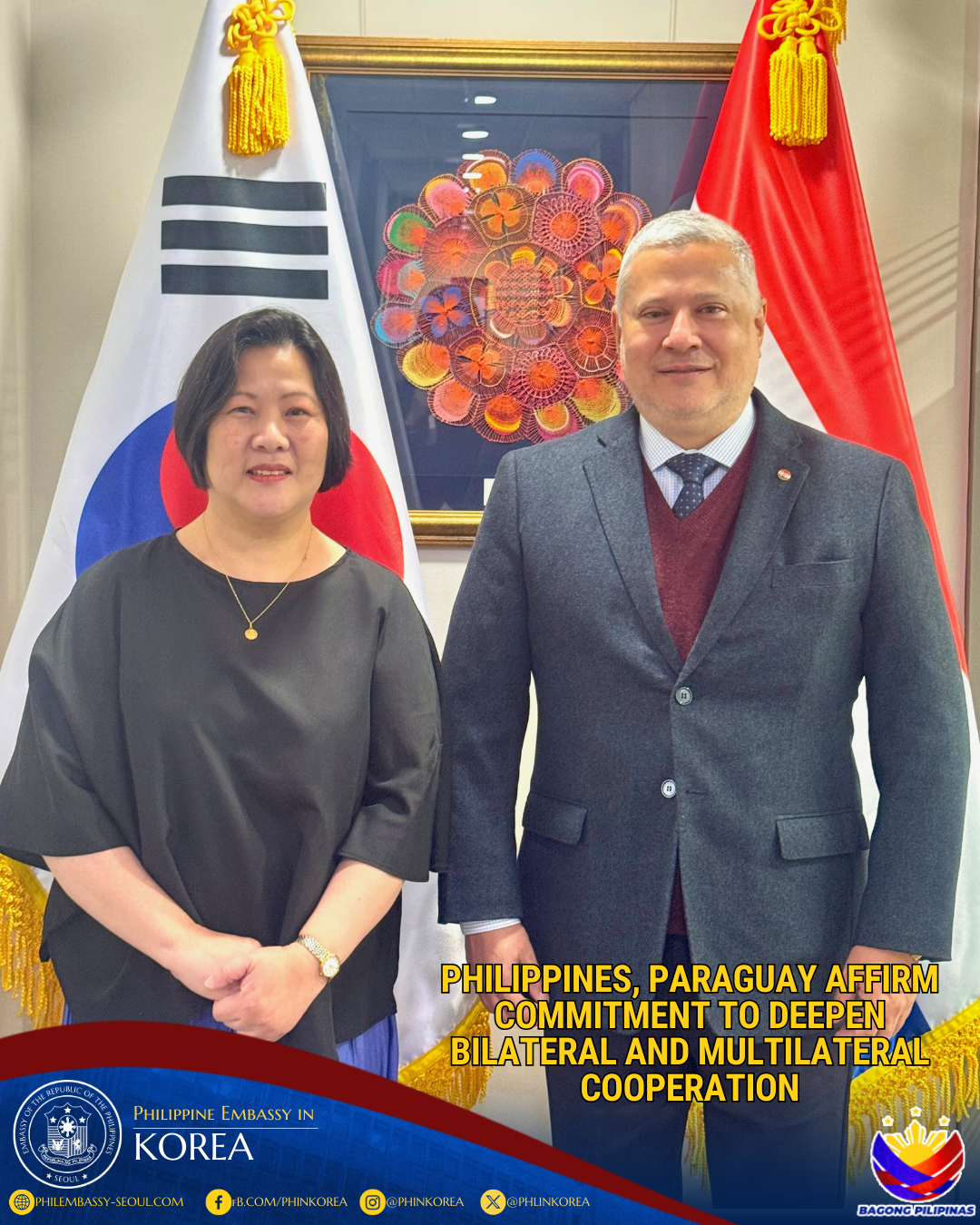Godmother of the Philippine Community
There is a small Philippines on the hill of Seongbuk-Dong.
With only the address that I got by phone, it was really difficult to find the Philippine Community from Seongbuk-Dong Office. I asked a passerby who did not know the exact location, but turning a corner, I found several Filipinos waiting for their mail and taking a walk in an alley. “Do you speak Korean? I came here to meet Sr. Miguela,†I said in Korean. They did not understand my question but beamed when I spelled out the name M-I-G-U-E-L-A. They all stopped what they were doing and led me to Sr. Miguela. I met an old lady trotting about in a nun costume with apron and slippers, saying “Oh my goodness! Why don’t you stop interviewing me? I’m so busy that I’m dying!†The year 2007 was the 50th anniversary of her religious vows. She is the member of the first Salesian Missionary Sisters Congregation in Korea and is called “the mother of Filipino workers in Korea.†At age 74, she became the first Filipino recipient of the Ilga Awards. The Ilga Awards, which turned 17 this year, was established to pay tribute to the memory of the founder of the Canaan Farmers School, the late Pastor Yong-Ki, Kim who devoted his whole life to the development of rural communities and the enlightenment of the Korean people. (He was a Ramon Magsaysay awardee himself.) The Ilga Awards committee selects two people every year in and out of Korea who have achieved outstanding work in various sector of society and won people’s respect for their deeds. Sr. Miguela fifty years ago Sr. Miguela was born to a faithful Catholic family in Luzon, Philippines and wanted to become a nun since her childhood. She wanted to join the Salesian Sisters Congregation so she went to Japan where the congregation was at that time and studied there. She came to Dorim-Dong, Seoul, Korea at the request of the Korean archdiocese. It was the beginning of the Korean Salesian Sisters Congregation with three Italians, one Korean and one Filipino, Sr. Miguela. At age 24 in 1957, she arrived by boat to help a Korean archdiocese impoverished by the Korean War. The young nun devoted her youth to poor war orphans, poor neighbors and migrant workers and 50 years have passed. Asked what has kept her from returning to her peaceful homeland since then, she answered smiling, “They needed me. When I came to Dorim-Dong at that time, all was completely dark. Poor people, hungry babies were all around, every corner of the district was slum, in ruins. Only we could speak English so day by day, we visited the US Army base and got bread and milk to feed babies and visited Yeongdeung- po Municipal Hospital to take care of patients. “There was no place for kids to go and they could get love and food at our congregation so they came to us every day. We taught them Korean letters and English and we felt that education was urgently needed for them.†She forgot her mother tongue, Tagalog, but can now speak Korean well, including the dialects of Kyungsang and Cheolla provinces. In the 1960s she taught typing and Japanese language to women factory workers at the Salesian Workers Dormitory in the Masan Free Export Zone for 10 years. In 1970 she served as a teacher at the elementary, middle and high school of the Salesian Foundation in Kwangju, Cheollanam-Do. “Most of the workers finished only elementary school at their home town and got a job in factories so they longed for schooling. Nobody could have as many pupils as me. It was a hard time for everybody, but when they finished middle school course, they could get double their monthly salaries! They were so happy with the increased salary because they could help the living of their family. “Nowadays, the Korean economy has advanced so much that most of us do not even understand that we had so hard time only several decades ago.†The economic situation of Korea and the Philippines has been reversed. Since the mid 1990’s, the problem of migrant workers in Korea became a hot social issue and Sr. Miguela started new work without hesitation. Eight years ago, she formed the Philippine community, regularly helping migrant workers, counseling, finding jobs and providing shelter. In the row house in Seongbuk-Dong, which is used as Philippine Catholic Center, male workers stay at the ground floor, on the second floor is the office and the third floor is where the women and children have free lodging and counseling. At the same time, many Filipino people began visiting Hyehwa-Dong Rotary near Seongbuk-Dong. The main reason was to attend the Filipino Mass on Sundays at Hyehwa-Dong Church. The Seoul archdiocese accepted the strong desire of the Filipinos, who are more than 90% Catholic, and arranged Mass for Filipinos in Tagalog, celebrated by Filipino priests every Sunday from 1:30 pm till 3:00 pm. A Filipino market also opened there and hundreds of Filipinos gather there every Sunday. Smiling shyly, Sr. Miguela said that the Filipino community started on a small scale at Jayang-Dong, Kwangjin-Ku. A new nest was built at Seongbuk-Dong through the consistent help of the Seoul archdiocese and the invisible helping hands of generous sponsors. She was also able to transfer from Shinkil-Dong to Sengbuk-Dong with their help. Her daily routine is showing up at the office early in the morning, checking companies on vacancies for Filipino workers, and informing the workers of the location of the companies; accepting cases of unpaid salary and severance payment and helping them find solutions. “I didn’t say anything about the award to anybody. Even these people who are staying here in Philippine Catholic Center do not know. To the Congregation, also I did not say anything and I just told that I’ll have a short trip to some place but many newspaper companies call by phone so… “Here, we are suffering from lack of hands; we have piles of counseling cases; there’s nobody except me who knows the works of Philippine Community from A to Z. So I cannot leave my desk but I have to have interviews and it presses me so hard.†It seemed she did not care about the interview at all, concerned only for the schedule of counseling. I told her loudly that remembering what she had done in Korea, we, Koreans must do kindness to Filipino people too. She smiled like a little girl. “Well, nowadays, we get great help from around us and there are many kinds of people helping us. The viewpoint about foreign workers also has changed much by TV programs such as, ‘Asia, Asia’, ‘Love in Asia’ and etc. “Only one thing! I wish Korean employers and coworkers do not beat Filipino workers by the reason that they are dull of hearing. Most of them are docile, tenderhearted and scared. They couldn’t say anything at their factory and come here to appeal their pains. Listening to them makes me feel miserable. “The weather in the Philippines is completely different from Korea. Like the weather, the personality of Filipinos is very different from Koreans. Koreans are quick-tempered, but Filipinos are very composed and slow. Due to the hot weather, they like to have a nap, do not have much experience in lifting heavy things and dislike hard work, so in many cases, they have very hard time doing their job in Korea. “Every day I scold them to move fast so that they could gain the good words from their employer and coworkers. They are slow and look lazy but most of them are Catholics and good-natured. Besides, they are as passionate and emotional as Koreans.†Most of the Filipino workers who come to the Philippine Center do not have any place to stay. The happiest thing for them here in the Community is to get a job and go to work. If the workers could not get a job and stay the whole day long in the Center, it may press Sr. Miguela. However, she encourages the workers, saying that they can work hard when they get a job – just wait a while. Unlike most of people who lead this kind of community, Sr. Miguela does not ask for help openly. She possesses the unique composure of the Filipino people. “If there is rice enough only for 10 people but we have 15 visitors, what shall we do? Yes, it is very simple – we can share the insufficient food.†What’s giving her strong will and toughness? “There are many people who help us,†she said. With her small frame, she has devoted herself for 50 years. Her devotion has not been in vain. Her pupils at the early school of the Salesian Congregation are more than 60 years old now. Hungry and with nowhere to go when they were boys and girls, they followed Sr. Miguela around even after school. Now they have not forgotten their schooldays; they help in her work and donate without giving their names. “There was one time when I experienced Korean kindness. About 7 years ago, a girl came to the Community. In the night she was pouring with sweat and appealed for help. She was in pain. We went to a hospital but they did not even examine her and told us that it was a simple stomach disorder. We didn’t know what to do so we took her to Ehwa University Hospital at Dongdae-moon,†says Sr. Miguela. “Nurses and interns were very kind. Even the doctor with the highest position did not show any discrimination against Filipino people and decided on an immediate Caesarean operation. She got an operation immediately. We did not even take any money for the medical treatment but they helped us so kindly. After discharge from the hospital, we were ready to pay but the whole amount was refunded. We took the money again to the hospital but they refused to accept it, saying that they did not want to charge because I was doing right work. “Ehwa University Hospital belongs to the Protestant organization but through this incident, I changed my viewpoint about Protestantism. I have a good relationship with many Protestant people even today. Regardless of religion, if there is any occasion for me to help anybody, I think I’ll help. “It might be a distinguishing character of Koreans to help each other regardless of religion. What happened to the baby that was born at that time? I heard it has entered an elementary school…†Several Filipinos were gathered around the TV set as we talked. They were all workers still waiting to get jobs. “Many Korean dramas are played on Philippine TV so many Filipinos like Korean movie stars and dramas very much,†Sr. Miguela said in Korean. Everybody understood what she said and smiled. Multi-national meals are prepared at the Philippine Center – bread and coffee for breakfast and rice and side dishes for lunch. In an alley in Seongbuk-Dong, a small Philippines has built a nest for itself, with a mix of scolding from Sr. Miguela (who is 99% Korean now), varied experiences of Filipinos, their laughter and their sighs. Sr. Miguela also showed deep interest in me, asking whether I found the way to the Center easily and whether I am married like an old Korean lady. She had been annoyed by the interview, but when it finished, she sighed with relief and came out the door to send me off. There is an old saying, “There are mothers because God cannot touch every corner of the world.†Here in Korea, Filipino workers are far from the reach of God and their mothers. For them, Sr. Miguela Santiago is it. - Magazine S, South Korea


 February 08, 2026
February 08, 2026
 February 07, 2026
February 07, 2026
 January 28, 2026
January 28, 2026
